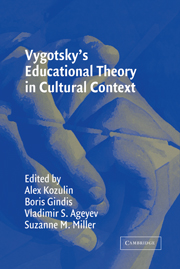Book contents
- Frontmatter
- Contents
- List of Contributors
- Series Foreword
- Introduction: Sociocultural Theory and Education: Students, Teachers, and Knowledge
- PART I CONCEPTS AND PARADIGMS
- PART II DEVELOPMENT AND LEARNING
- 6 Periods in Child Development
- 7 Development Through the Lifespan
- 8 Learning and Development of Preschool Children from the Vygotskian Perspective
- 9 The Learning Activity in the First Years of Schooling
- 10 Remediation Through Educationw
- PART III SOCIOCULTURAL THEORY APPLICATION IN THE CLASSROOM
- PART IV DIVERSE LEARNERS AND CONTEXTS OF EDUCATION
- Author Index
- Subject Index
- Titles in the series
- References
10 - Remediation Through Educationw
The Developmental Path Toward Reflection
Published online by Cambridge University Press: 05 June 2012
- Frontmatter
- Contents
- List of Contributors
- Series Foreword
- Introduction: Sociocultural Theory and Education: Students, Teachers, and Knowledge
- PART I CONCEPTS AND PARADIGMS
- PART II DEVELOPMENT AND LEARNING
- 6 Periods in Child Development
- 7 Development Through the Lifespan
- 8 Learning and Development of Preschool Children from the Vygotskian Perspective
- 9 The Learning Activity in the First Years of Schooling
- 10 Remediation Through Educationw
- PART III SOCIOCULTURAL THEORY APPLICATION IN THE CLASSROOM
- PART IV DIVERSE LEARNERS AND CONTEXTS OF EDUCATION
- Author Index
- Subject Index
- Titles in the series
- References
Summary
In spite of the fact that the field of remedial (special) education and school psychology was the source and testing ground for many of Vygotsky's innovative ideas, this domain itself has remained in the shadow of his scientific heritage in the West. The publication of the second volume of Vygotsky's collected works, The Fundamentals of Defectology (Vygotsky, 1993), has created a knowledge base for the theoretical elaboration and practical implications of Vygotsky's ideas within the North American system of special education. In order for this volume to be of the utmost help, the following should be considered:
Defectology is the term that reflects the area of Vygotsky's research and practice that is relevant to contemporary special education and school psychology. The term itself sounds rather degrading. As once noted by McCagg (1989, p. 40), this term would not survive a scientific discussion in the Western world today because it carries too many negative connotations regarding individuals with a disability. Ironically, the negative undertone of the term itself is in no way present in the inspiring and positive attitude of Vygotsky writings. The word defectologia (or defectology in the English transliteration) literally means the study of defect. In Russia, for more than a century this term has referred to the study of children with disabilities and the methods used for their evaluation, education, and upbringing.
[…]
- Type
- Chapter
- Information
- Vygotsky's Educational Theory in Cultural Context , pp. 200 - 222Publisher: Cambridge University PressPrint publication year: 2003
References
- 12
- Cited by



